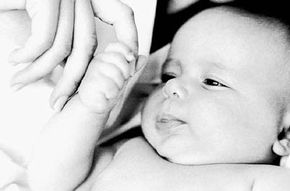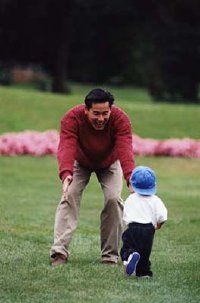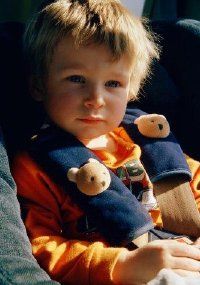Sudden infant death syndrome, or SIDS, is one of the most tragic and puzzling causes of infant death. SIDS has occurred for thousands of years. In the past, it was called "overlaying" because it was believed that the mother had rolled onto the baby during sleep. Now it is known that this is not the case, but the true cause of SIDS is still unknown. In fact, SIDS is only diagnosed when no other cause of death can be identified.
With SIDS, death occurs quickly and usually without being noticed immediately. The baby apparently dies during sleep and without suffering. In the few reported instances in which a SIDS death was observed, the baby simply stopped breathing. In the most common situation, an apparently healthy baby is put to bed and is later found dead.
Typically, younger infants are at higher risk of death from identifiable causes, and the risk declines as the baby becomes older. However, in contrast, few SIDS deaths occur in infants younger than one month old; most deaths occur when the baby is two to four months old, and the incidence of SIDS decreases dramatically after the age of six months. SIDS rarely occurs in babies one to two years old.
SIDS deaths occur in families from all socioeconomic backgrounds, from all races, from all ethnic backgrounds, and from urban and rural areas. Autopsies have shown no consistent findings to indicate a cause of death. Although parents cannot anticipate or prevent SIDS, they need to be informed about it in case their child or the child of someone they know becomes a victim of a SIDS death.
While some factors seem to be associated with a higher incidence of SIDS, none has been established as a cause. These factors include soft bedding or stuffed toys in the crib, which can cause suffocation; cigarette smoke (more babies who die of SIDS come from environments in which they were exposed to smoke); overheating; lying on the tummy in the prone position; and premature birth.
Research into the cause of SIDS is difficult because of all the events occurring when a baby is two to four months old-for example, the baby may switch from breast to bottle or begin receiving immunizations. This has raised many false alarms, but to date, research has not proved that the method of feeding, vaccination, or any specific event is linked to SIDS.
The "Back to Sleep" campaign, sponsored by the National Institute of Child Health and Human Development (NICHD), is credited with reducing the number of deaths from SIDS by more than 50 percent since 1992, when it was launched. The campaign has raised awareness that parents should put their babies to sleep on their backs on firm surfaces that do not have soft bedding, loose blankets, or stuffed toys.
All of the baby's caregivers, including grandparents and babysitters, should also know this information. Swaddling, or carefully wrapping a baby in a blanket, may comfort your baby and help her feel more snug and secure while sleeping on her back. Using a pacifier may also help prevent SIDS (and has not been shown to cause any damage to developing teeth in this age group). Avoid putting your baby to sleep in your bed with you; the blankets and pillows put her at risk for suffocation.
Despite all these precautions, some babies may still experience an "apparent life-threatening event," or ALTE. Babies who experience ALTE may stop breathing, turn pale or blue, or become limp. If this happens, gently rock or otherwise stimulate your baby to promote breathing. Never shake your baby under any circumstances. Shaking a baby can cause irreversible brain damage. When your baby begins breathing again, immediately take her to the nearest emergency department.
Your doctor will want to examine the baby and perform certain tests. After these tests are concluded, your doctor may elect to send your baby home for a short time and, while there, have her connected to an infant cardiopulmonary monitor. Such monitors are designed only to warn parents of breathing difficulties or low heart rate in their infants, not to prevent SIDS from occurring.
Many episodes of choking or cessation of breathing are not caused by ALTE events; they should be studied to determine the actual cause and then treated accordingly. Many parents have read or heard a lot about SIDS, and they have become very concerned when their babies have problems with pauses in respiration and other respiratory events. The majority of these events are not related to SIDS. However, if you are concerned about your baby, consult your doctor.
As one could imagine, Sudden Infant Death Syndrome claims more victims than just the baby itself. Parents, siblings, and even babysitters often feel responsible for the untimely death. The unfortunate resulting trauma sometimes leads to family disintegration: divorce, substance abuse, blame and severe psychological problems. Read how to overcome guilt about SIDS next.
This information is solely for informational purposes. IT IS NOT INTENDED TO PROVIDE MEDICAL ADVICE. Neither the Editors of Consumer Guide (R), Publications International, Ltd., the author nor publisher take responsibility for any possible consequences from any treatment, procedure, exercise, dietary modification, action or application of medication which results from reading or following the information contained in this information. The publication of this information does not constitute the practice of medicine, and this information does not replace the advice of your physician or other health care provider. Before undertaking any course of treatment, the reader must seek the advice of their physician or other health care provider.



